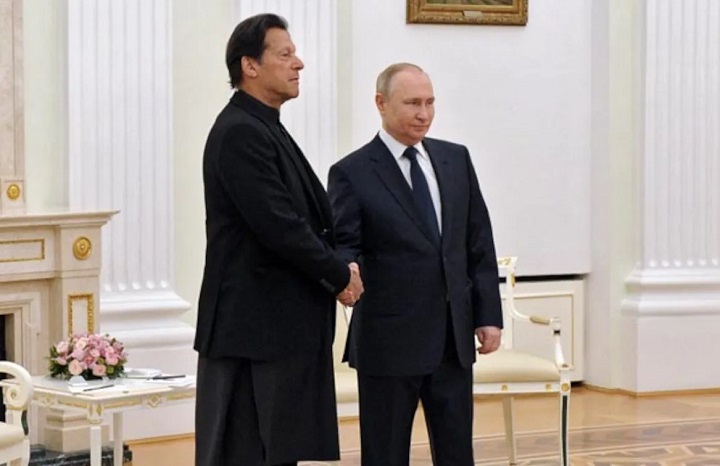The Kremlin issued a brief statement, saying that the two leaders of Russia and Pakistan discussed the main aspects of bilateral cooperation and exchanged views on current regional topics, including developments in South Asia. In a handout, the Prime Minister’s Office (PMO) said that the two leaders held wide-ranging consultations on bilateral relations as well as regional and international issues of mutual interest. (Dawn)
Comment:
The partition of the British India into two separate states (India and Pakistan) coincided with the beginning of Cold War. The newly independent nation states, emerging from colonialism and full of structural weaknesses, faced the dilemma of choosing an alliance between the two superpowers (the United States and Soviet Union) in this emerging bipolar international system. In the last 75 years of this so called independence, Pakistan made economic and military alliances with the West but always paid for its choice. Mostly, Pakistan faced open retaliation and antagonism from the Soviet-Union for its pro-Western choices. As Pakistan decided to stay close to US and considered itself safe serving it and fighting its wars, the Soviet Union as a superpower in the Cold War Union frequently voted against Pakistan’s interests in all international forums, and in particular, against Pakistan’s position on Kashmir in the United Nations. In the 1971 Indo–Pakistan War, Pakistan suffered a humiliating surrender in East Pakistan that resulted in the birth of Bangladesh. Pakistani intelligentsia consider the dismemberment of a united Pakistan as the heaviest price Islamabad paid for Pakistan’s role in facilitating US–China rapprochement. It was India–Soviet Mutual Friendship treaty that provided India with political and strategic support during the 1971 Indo–Pakistan War. With Z. A. Bhutto, who favored socialism, things started to warm up with Russia. He visited the USSR twice in a span of five years (1972-77). In return, a number of Soviet economic delegations and steel experts visited Pakistan. Road metalling machinery and tractors were imported from Russia and a contract was signed in Islamabad with a Soviet firm for the purchase of machinery worth Rs. 2300 million.( The Foreign Policy of Zulfiqar Ali Bhutto). In 1975, Pakistan and the USSR entered into an annual program of exchange of scientific expertise. Bhutto’s policies of nationalization and the tilt towards socialism were encouraged and praised and in May 1977, the Soviet trade delegation arrived in Islamabad and signed a trade protocol providing for an exchange of goods worth $ 15 million. With General Zia-ul-Haq, taking over government on 5 July 1977, Pak–Soviet relations nosed owned, and stayed rough during Zial ul Haq and Nawaz Sharif governments as they tried hard to make things work with USA. A new phase started after the Soviet military intervention in Afghanistan in December, 1979. This started a new game of manipulation and the term Jihad which is a sacred obligation was used in minting favours and fooling people. The time period till Zia’s death, strategically Pakistan and Afghanistan, was covered in folds of manipulations and deceptions. Pakistan paid heavily for the support that was given to US against USSR, and this support turned into a war against its own people in the time of Pervaiz Musharraf. Matters worsened, and we started serving them with the lives of our sons and honour of our daughters.
Now is the time of Imran khan and the like of all his predecessors who believe in continuing with the life of slavery and humiliation. 75 years of being on this merry go round of horrors is not enough to learn that support for Muslims is not in dark, mischievous places but only support for Muslims lies in the light of Islam. Neither the US, nor USSR, or China can save Muslims of this world from destruction. No economic, military or strategic maneuver in disobedience of Allah (swt) can bring any relief. Also for Muslims relief is not in gaining profits, relief is in being united under the flag of Rasool Allah (saw) and fighting for the sake Allah (swt). In this visit of Imran Khan, there is no honour, success or smartness, nor is it an exciting time for the visit. In fact, it is time to break free from the complexes of the colonial era and step into an era where only dependence is on Allah (swt). The time when the West is busy with this issue, instead of taking sides, Muslims should work for the establishment of the Khilafah (Caliphate) upon the method of the Prophethood. Only then the world and its happenings will make sense. Under the shade of Khilafah, situations like these strengthen its might. No other country would dare to go to war without ascertaining the intentions of the Khilafah.
(فَلَمَّا كُتِبَ عَلَيْهِمُ الْقِتَالُ إِذَا فَرِيقٌ مِّنْهُمْ يَخْشَوْنَ النَّاسَ كَخَشْيَةِ اللّهِ أَوْ أَشَدَّ خَشْيَةً وَقَالُواْ رَبَّنَا لِمَ كَتَبْتَ عَلَيْنَا الْقِتَالَ لَوْلا أَخَّرْتَنَا إِلَى أَجَلٍ قَرِيبٍ قُلْ مَتَاعُ الدَّنْيَا قَلِيلٌ وَالآخِرَةُ خَيْرٌ لِّمَنِ اتَّقَى وَلاَ تُظْلَمُونَ فَتِيلاً)
“When the fighting was ordained for them, behold! a section of them fear men as they fear Allah or even more. They say: “Our Lord! Why have you ordained for us fighting? Would that you had granted us respite for a short period?” Say: “Short is the enjoyment of this world. The Hereafter is (far) better for him who fears Allah, and you shall not be dealt with unjustly even equal to the Fatila (a scalish thread in the long slit of a date¬stone).”
Ikhlaq Jehan

